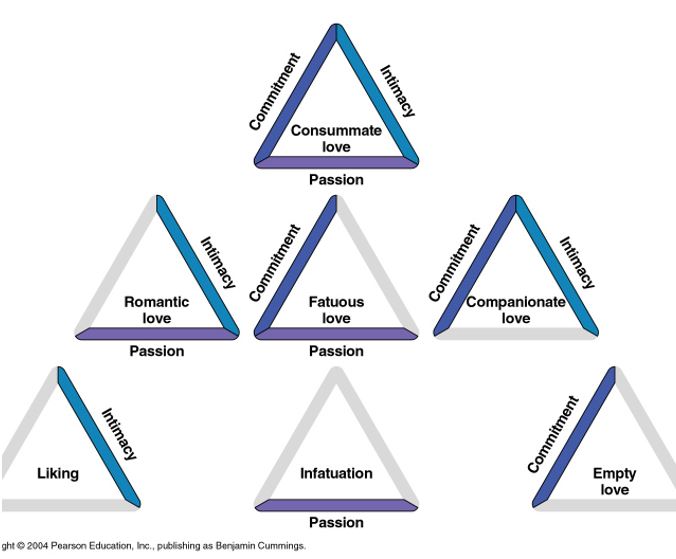By: Kacy L. Michel, Ph.D.
“You complete me.”
The words of Jerry Maguire are so familiar at this point, that they have become part of our popular lexicon. While cliché, the actual psychology of love and relationships is anything but. As someone who focuses mainly on sexuality and love in a professional context, I enjoy teaching my students that love can actually be scientifically studied just like any other concept.
When explaining the different types of love, I find that Sternberg’s Triangular Theory sheds academic light on why some relationships last and others fizzle quite quickly.

I explain to my students that consummate love—at the top of the pyramid—is where both partners feel all three dimensions of love. These dimensions include intimacy, passion and commitment—where Jerry Maguire comes in. However, many relationships don’t last because one or both partners is missing one or more of these dimensions.
I ask my students to consider different kinds of relationships:
Have you ever been put in the friend zone?
That is companionate love.
Did your parents stay together “for the kids?”
They were probably practicing empty love.
Have you engaged in hook ups with no intention of a relationship?
That is infatuation and/or fatuous love.
My students are typically fascinated to realize that the psychology of love, something rather abstract, can be studied and modeled in such an objective way. To further reinforce this concept, I often use the following activity.
In Class “Love Carousel” Activity
Materials Needed:
- Scotch tape
- 4 Sheets of Paper
- Pen/Pencil
My students love this activity (pun intended), because it actually gets them on their feet and moving around the physical classroom. It also facilitates group work, team building and creative, critical thinking. Prior to class, I write one sentence on one blank sheet of paper and tape that to one side of the room. I then tape the other two to four sheets around the room.
Since this activity pairs with Sternberg’s Theory, I write questions such as the following:
- How do you know someone is “The One?”
- What does it mean to be in the “Friend Zone?”
- Do you think unrequited love can ever move to a relationship? If so, how?
- What would you do if you were married and felt like you were in an “empty love” relationship?
Then, I have students divide into three of four groups. I assign one group to each paper. I give groups one to two minutes to brainstorm and write down their answers. Then, I tell each individual group to “carousel” in a clockwise manner to the next piece of paper. Groups can’t repeat what another group has said.
Once groups have completed each station, I ask the students to read the responses, and we have a closing dialogue on Sternberg’s Triangular Theory of Love.
- Tip 1: You can easily translate this “Carousel” activity to almost any subject matter. The key is to ask open-ended questions that both engage and challenge students.
- Tip 2: If you are teaching an online section via Zoom, you can assign different breakout rooms with different questions.
- Tip 3: Keep groups small so that each person has an opportunity to participate.
Why not take the simple step to add a carousel activity to enhance your pedagogy today? While it is doubtful that a student will say “this class completes me,” it is possible that a student will emerge from your class with a greater understanding of the complex nature of love.
Get More Teaching Tips
Want more ways to take teaching to the next level? Discover resources for course formats and other ways to build professional development in today’s higher-education landscape.


